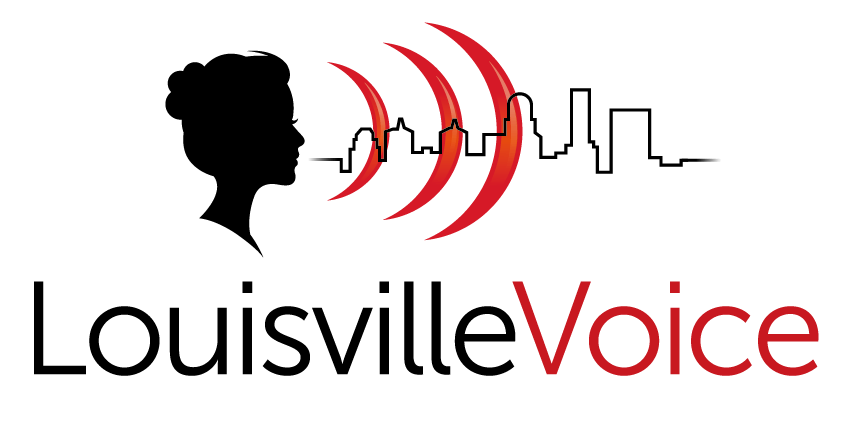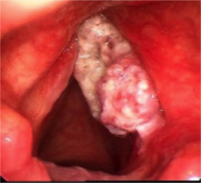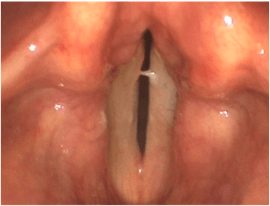VOCAL CORD CANCER, DYSPASIA, AND LEUKOPLAKIA
We provide minimally invasive treatment for vocal cord tumors
VOCAL CORD CANCER, DYSPLASIA, AND LEUKOPLAKIA
What are signs of vocal cord cancer?
Changes in your voice can be a sign of vocal cord issues, and cancer is one of the serious problems to consider.
Watch out for these symptoms of vocal cord cancer (laryngeal cancer):
- Change in quality of voice
- Increased effort to speak
- Persistent sore throat
- Difficulty swallowing
- Noisy breathing
- Difficulty breathing
VOCAL CORD CANCER, DYSPLASIA, AND LEUKOPLAKIA
How are vocal cord cancers diagnosed?
The vocal cords are unable to be seen by looking in the back of your throat. Suspicious lesions can be identified on videostroboscopy in our office. Definitive diagnosis of a vocal cord cancer requires a biopsy with analysis of the tissue underneath a microscope by a pathologist. If you choose to pursue laser surgery, a biopsy and removal of the cancer can be performed at the same time to prevent the need for multiple surgeries.
LASER VOCAL CORD SURGERY
Why consider laser surgery for the treatment of cancer of the larynx?
There are approximately 13,000 people per year diagnosed with laryngeal cancer, with 60% of those cancers originating from the vocal cords (glottis). Vocal cord cancers have traditionally been treated with radiation therapy. Radiation therapy, while incredibly effective, targets both the diseased and non-diseased parts of the vocal cords as well as the surrounding structures, including the skin of the neck, pharynx and esophagus. That means that radiation therapy can damage tissue that is healthy and can destroy or scar the parts of the vocal cords not involved with cancer. Patients can develop swallowing issues years after their radiation therapy as a result. Radiation treatment is traditionally only used once in a single part of the body, meaning it often cannot be repeated if additional cancers arise in that area. Laser surgery offers the same cure rate for early vocal cord cancer without the long term side effects. Additionally, laser surgery is generally performed in a single outpatient setting instead of 5-7 weeks of daily radiation therapy.
The potassium titanyl phosphate (KTP) laser targets cancer growth at the source by ablating blood vessels. Cancer growth is dependent on blood vessels to grow (angiogenesis). The KTP works by targeting the blood vessels specifically, and preserving the healthy vocal cord tissue underneath the cancer. If additional concerning lesions of the vocal cord develop, laser surgery can be repeated, unlike radiation therapy. Some patients can develop precancerous lesions on their vocal cords in addition to cancer. These precancerous lesions can be addressed with the laser as well and, if small enough, can be done under local anesthetic without the need for general anesthesia.
The surgery can also be performed for localized glottic cancer after failed radiation treatment.
Reference: Zeitels SM et al., Oncologic efficacy of angiolytic KTP laser treatment of early glottic cancer. Ann Otol Rhinol Laryngol. 2014 Dec;123(12):840-6. doi: 10.1177/0003489414538936. Epub 2014 Jun 26.
Barbu et a., Salvage Endoscopic Angiolytic KTP laser Treatment of Early Glottic Cancer After Failed Radiotherapy., Ann Otol Rhinol Laryngol. 2013 Apr; 122(4):235-0.
Friedman et al., Voice outcomes for photoangiolytic KTP laser treatment of early glottic cancer. Ann Otol Rhinol Laryngol. 2013;122(3):151-158.
LASER VOCAL CORD SURGERY
Who is a candidate for cancer laser surgery?
Patients who are healthy enough to tolerate a general anesthesia procedure and have an early vocal cord cancer (T1 or T2) or precancers/dysplasia of the true or false vocal folds. This includes lesions such as leukoplakia, erythroplakia, or keratosis that affects the quality of your voice.
We will be able to tell you the day of consultation if you are a good candidate for this procedure.
LASER VOCAL CORD SURGERY
What can I expect from a cancer laser surgery?
All cancer surgery involves general anesthesia. The procedures are performed completely endoscopically, meaning there are no incisions or cuts on the outside of your neck. A metal laryngoscope is placed through the mouth to allow visualization of the vocal cords. If a biopsy has not already been performed, it will be performed at the time of this surgery. Frozen pathology will confirm diagnosis and clear margins. The entire procedure is performed with the use of a microscope to obtain ultra-narrow margins and preserve normal vocal cord tissue. Depending on how extensive the cancer is, a patient may require staged surgery with the 2nd procedure occurring six to eight weeks after the first one to completely remove all of the cancer.
The surgery is outpatient. Patients can expect to eat and speak right after the procedure. Your voice may be more hoarse immediately following the procedure as the surgical wound heals, but will improve over the following weeks. It is not uncommon to have a sore throat or tongue following the procedure, due to placement of the laryngoscope. Dr. Burckardt may ask you to avoid “reflux” foods (no greasy, spicy, citrus, or caffeine) while the wound is healing. There is little down time from the procedure. Depending on your job, you may be able to return to work the same week as surgery.
After the procedure, patients will be followed closely at 4-6 week intervals for one year to make sure the vocal cords are healing appropriately and no new cancers arise. After the first year, patients will still need to be seen for surveillance but the follow-up interval will gradually increase.
If you have ever been diagnosed with head and neck cancer, you should have lifelong surveillance with an Otolaryngologist to ensure a second tumor does not develop.
LASER VOCAL CORD SURGERY
What are complications are possible with laser surgery?
Complications from laser surgery are uncommon. The biggest risk of the procedure is the risk of undergoing general anesthesia. Complications from the laryngoscopy include:
- Temporary sore throat
- Chipped, damaged, or broken teeth. Dr. Burckardt uses tooth guards to prevent this complication.
- Superficial cuts inside the mouth or throat.
- Temporary changes in taste or numbness of the tongue
- Granuloma formation





